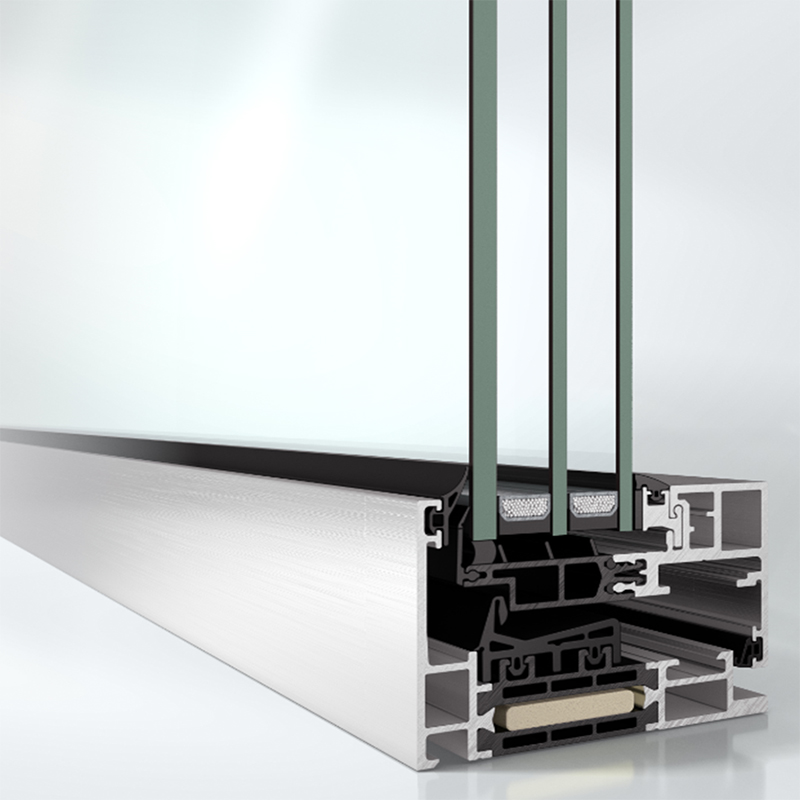· Fixed frame· Inward opening window· Outward opening window· Sliding window
Broken bridge aluminum doors and windows usually have thick glass. In modern buildings, broken bridge aluminum doors and windows are highly favored for their excellent thermal insulation, sound insulation performance, and beautiful appearance. As an important component of doors and windows, the thickness of glass not only affects the overall performance of doors and windows, but also directly affects the safety and comfort of use. Today, Zunheng will take you to understand how thick the glass of broken bridge aluminum doors and windows is generally.
Common thicknesses of broken bridge aluminum door and window glass
The thickness of broken bridge aluminum door and window glass varies depending on its application scenarios and requirements. Generally speaking, common thicknesses of broken bridge aluminum door and window glass include 5mm, 6mm, 8mm, etc., which are sufficient to meet the needs of most households and office spaces. In addition, there are thicker glass options of 10mm, 12mm, or even 15mm available to meet specific environmental requirements.

Application scenarios of glass with different thicknesses
5mm glass: This thickness of glass is relatively thin and lightweight, suitable for scenarios with small windows or where strong insulation and sound insulation effects are not required. For example, partition glass on balconies, exhaust fans in kitchens, etc. It has good transparency and can meet basic lighting needs, while the price is relatively low, making it an economical choice.
6mm glass: 6mm glass is a commonly used thickness, suitable for households with an area of less than 20 square meters and small window areas. It can provide certain insulation and sound insulation effects without being too bulky, suitable for ordinary bedrooms, living rooms and other places. Meanwhile, due to its moderate thickness, it is often used as the outer or inner layer of insulating glass.
8mm glass: For units with an area of around 50 square meters and large window areas, 8mm glass is a more suitable choice. It can provide better insulation and sound insulation effects without excessively affecting lighting. In some large villas, such as living rooms and bedrooms, 8mm glass is often used as the main material for windows.
In addition, there are some special scenarios that require thicker glass. For example, in cold regions or places where higher insulation performance is required, 10mm or thicker glass can be chosen; In places where higher sound insulation performance is required, such as residential buildings near roads or airports, thicker glass can also be chosen.
Precautions for choosing broken bridge aluminum door and window glass
Consider practical needs: When choosing broken bridge aluminum door and window glass, the first thing to consider is your own actual needs. Including the size of the windows, the climatic conditions of the environment, and the requirements for insulation and sound insulation performance. Only by understanding one's own needs can one choose the most suitable glass for oneself.
Emphasize brand and quality: There are numerous glass brands in the market, but their quality varies greatly. When choosing, attention should be paid to the choice of brand and quality. Generally speaking, glass from well-known brands has better quality assurance and more comprehensive after-sales service.
Pay attention to installation and maintenance: In addition to selecting suitable glass, also pay attention to the installation and maintenance of doors and windows. Proper installation and maintenance can ensure that the performance of doors and windows is fully utilized, while also extending their service life.
Choosing the appropriate glass thickness according to one's actual needs, and paying attention to brand, quality, installation, and maintenance issues, can ensure that the performance of doors and windows is fully utilized, providing a comfortable and safe environment for homes and workplaces.